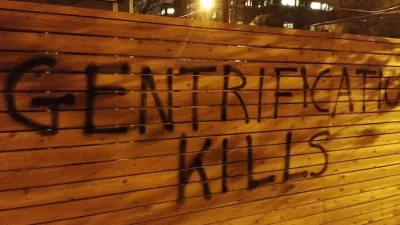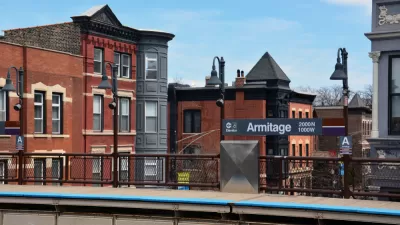A new book by Samuel Stein links planning to the causes of a global finance industry that values worldwide real estate at $217 trillion, or 60 percent of the world's assets.

An article by Oscar Perry Abello inspired by the release of a new book, Capital City: Gentrification and the Real Estate State, by Samuel Stein, provides the inspiration for a reality check for planners about their role in the racism of past and present land use regimes in the United States and a call to action to overthrow the status quo. Decades after the displacement of urban renewal and urban highway construction, the situation is different:
Stein’s book makes the case that planners today find themselves at the unchecked mercy of global finance, for whom real estate is now valued at some $217 trillion. That’s 60 percent of global assets, and three-quarters of those assets are in housing. He argues that no effective counterweight exists right now to the voices and interests of finance — as there have been, at times, in the past, and there could be again. Without an effective counterweight, nothing will push back against the constant pressure to drive up real estate values as the end goal or as an essential means to other ends. It reduces planners to mere wealth managers, wittingly or unwittingly.
The suggestion of the article and the book, according to Abello, are that community organizers can provide that effective counterweight. "The real challenge of today, as Stein points out, is finding the political means to shift the frame of what’s considered possible."
Next City has also published a long passage from Stein's book, published on March 5, 2019 by Verso Books.
FULL STORY: To Save Urban Planners, Cities Need Community Organizers

Maui's Vacation Rental Debate Turns Ugly
Verbal attacks, misinformation campaigns and fistfights plague a high-stakes debate to convert thousands of vacation rentals into long-term housing.

Planetizen Federal Action Tracker
A weekly monitor of how Trump’s orders and actions are impacting planners and planning in America.

San Francisco Suspends Traffic Calming Amidst Record Deaths
Citing “a challenging fiscal landscape,” the city will cease the program on the heels of 42 traffic deaths, including 24 pedestrians.

Defunct Pittsburgh Power Plant to Become Residential Tower
A decommissioned steam heat plant will be redeveloped into almost 100 affordable housing units.

Trump Prompts Restructuring of Transportation Research Board in “Unprecedented Overreach”
The TRB has eliminated more than half of its committees including those focused on climate, equity, and cities.

Amtrak Rolls Out New Orleans to Alabama “Mardi Gras” Train
The new service will operate morning and evening departures between Mobile and New Orleans.
Urban Design for Planners 1: Software Tools
This six-course series explores essential urban design concepts using open source software and equips planners with the tools they need to participate fully in the urban design process.
Planning for Universal Design
Learn the tools for implementing Universal Design in planning regulations.
Heyer Gruel & Associates PA
JM Goldson LLC
Custer County Colorado
City of Camden Redevelopment Agency
City of Astoria
Transportation Research & Education Center (TREC) at Portland State University
Jefferson Parish Government
Camden Redevelopment Agency
City of Claremont





























